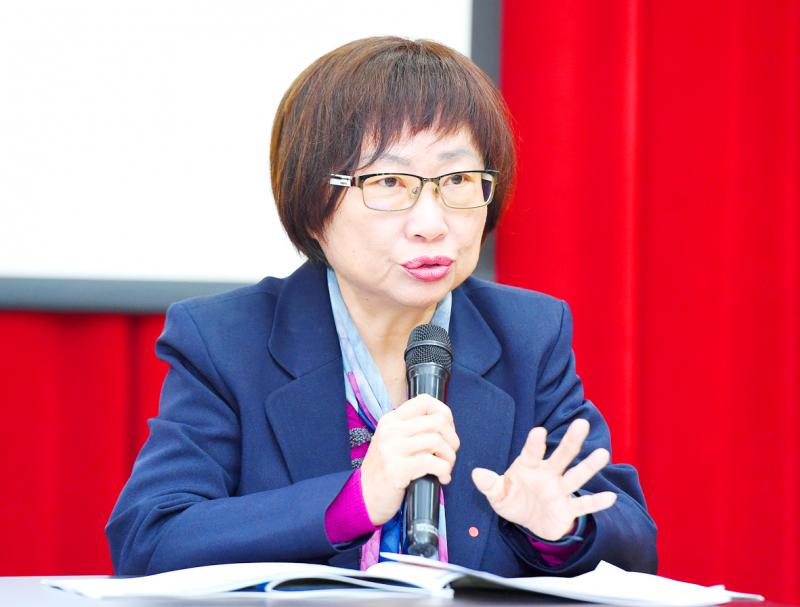The Ministry of Health and Welfare must do more to safeguard the rights of people with disabilities, the Control Yuan said on Monday.
The systems used to assess disabilities and the need for welfare services remain too narrowly focused, concentrating primarily on injuries, and welfare-related services are not conducted well, Control Yuan members said in a report.
New assessment systems were introduced in 2012, but the more conventional approaches remain in use, said Control Yuan members Wang Yu-ling (王幼玲) and Yang Fang-wan (楊芳婉), who conducted the investigation.

Photo: Liao Chen-huei, Taipei Times
The original assessment for disabilities used a system with 16 categories of injuries and diseases, but the categories sometimes contradicted one another, while not all types of disabilities were included, Wang said.
The nation later adopted the WHO’s International Classification of Functioning, Disability and Health, which has eight main health and health-related domains, and a list of “activities and participation,” and “environmental factors,” for more accurate assessment.
However, adoption of the new systems appears to have been just a formality, as people with disabilities who have true welfare needs can fail to meet requirements stipulated in the regulations, Wang said.
There is a large gap between the initial intent to protect the human rights of people with disabilities when the systems were introduced, and the reality of their enforcement today, she said.
For example, people who have only one functioning ear or eye are not considered to have a disability and therefore cannot access relevant services, she said.
When using the new system, it is important to include comprehensive factors, such as individual experiences, needs, activities and participation, and social environments, Wang said.
The ministry needs to adjust its practices so that the human rights protection model stated in the UN’s Convention on the Rights of Persons with Disabilities can be truly met, she said.
During their investigation, she and Yang reviewed documents from the ministry, consulted experts and made site visits to five cities and counties, Wang added.

HORROR STORIES: One victim recounted not realizing they had been stabbed and seeing people bleeding, while another recalled breaking down in tears after fleeing A man on Friday died after he tried to fight the knife-wielding suspect who went on a stabbing spree near two of Taipei’s busiest metro stations, Taipei Mayor Chiang Wan-an (蔣萬安) said. The 57-year-old man, identified by his family name, Yu (余), encountered the suspect at Exit M7 of Taipei Main Station and immediately tried to stop him, but was fatally wounded and later died, Chiang said, calling the incident “heartbreaking.” Yu’s family would receive at least NT$5 million (US$158,584) in compensation through the Taipei Rapid Transit Corp’s (TRTC) insurance coverage, he said after convening an emergency security response meeting yesterday morning. National

Taiwan has overtaken South Korea this year in per capita income for the first time in 23 years, IMF data showed. Per capita income is a nation’s GDP divided by the total population, used to compare average wealth levels across countries. Taiwan also beat Japan this year on per capita income, after surpassing it for the first time last year, US magazine Newsweek reported yesterday. Across Asia, Taiwan ranked fourth for per capita income at US$37,827 this year due to sustained economic growth, the report said. In the top three spots were Singapore, Macau and Hong Kong, it said. South

PLANNED: The suspect visited the crime scene before the killings, seeking information on how to access the roof, and had extensively researched a 2014 stabbing incident The suspect in a stabbing attack that killed three people and injured 11 in Taipei on Friday had planned the assault and set fires at other locations earlier in the day, law enforcement officials said yesterday. National Police Agency (NPA) Director-General Chang Jung-hsin (張榮興) said the suspect, a 27-year-old man named Chang Wen (張文), began the attacks at 3:40pm, first setting off smoke bombs on a road, damaging cars and motorbikes. Earlier, Chang Wen set fire to a rental room where he was staying on Gongyuan Road in Zhongzheng District (中正), Chang Jung-hsin said. The suspect later threw smoke grenades near two exits

The Forestry and Nature Conservation Agency yesterday launched a gift box to market honey “certified by a Formosan black bear” in appreciation of a beekeeper’s amicable interaction with a honey-thieving bear. Beekeeper Chih Ming-chen (池明鎮) in January inspected his bee farm in Hualien County’s Jhuosi Township (卓溪) and found that more than 20 beehives had been destroyed and many hives were eaten, with bear droppings and paw prints near the destroyed hives, the agency said. Chih returned to the farm to move the remaining beehives away that evening when he encountered a Formosan black bear only 20m away, the agency said. The bear